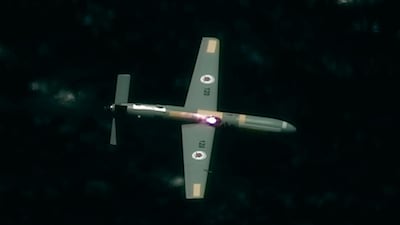The Israeli military on Monday said a test of an airborne, high-power laser that can shoot down drones was a success.
The country already has a large and sophisticated air defence system.
The military said its Iron Dome missile defence system intercepted 90 per cent of the thousands of rockets fired from Gaza during the 11-day war in May.
They said the as-yet-unnamed laser weapon could be incorporated in Israel's multi-tier air defences, which include the Iron Dome system for downing short-range rockets and the David's Sling and Arrow systems against ballistic missiles.
A prototype was developed with Israeli electronics company Elbit Systems and was mounted on a civilian plane.
It shot down several drones in a recent test over the Mediterranean Sea, said Brig Gen Yaniv Rotem, head of military research and development at the Defence Ministry.
"As far as we know we are the first one [country] – but maybe, for sure we are among the first countries – that have tried and succeeded [at] such an ... interception," he said.
“The ability to intercept and destroy threats from the air is ground-breaking,” Gen Rotem said. “Israel is among the first countries to use such capabilities.”
During the test, the system shot down drones from within a range of about 1km.
Elbit makes C-Music, a defence system fitted to aircraft that uses a laser to "blind" incoming missiles. Oren Sabag, a senior Elbit official, said the new laser weapon would use tracking technologies similar to C-Music's but would destroy targets by heating them up so they catch fire in "a few seconds".
Gen Rotem said a 100-kilowatt prototype with a range of 20km would come out in three to four years. That suggested an operational version would take longer to roll out.
The ministry, Elbit and state-owned Rafael Advanced Defence Systems Ltd are also working on a ground-based laser weapon for shooting down aerial threats. That would have a range of 8-10 km and be operational by 2025, the ministry said.
The airborne version would have an advantage because it could be operated over clouds, eliminating bad-weather disruptions that can afflict ground-based lasers, Gen Rotem said.
UAE currency: the story behind the money in your pockets
Top tips
Create and maintain a strong bond between yourself and your child, through sensitivity, responsiveness, touch, talk and play. “The bond you have with your kids is the blueprint for the relationships they will have later on in life,” says Dr Sarah Rasmi, a psychologist.
Set a good example. Practise what you preach, so if you want to raise kind children, they need to see you being kind and hear you explaining to them what kindness is. So, “narrate your behaviour”.
Praise the positive rather than focusing on the negative. Catch them when they’re being good and acknowledge it.
Show empathy towards your child’s needs as well as your own. Take care of yourself so that you can be calm, loving and respectful, rather than angry and frustrated.
Be open to communication, goal-setting and problem-solving, says Dr Thoraiya Kanafani. “It is important to recognise that there is a fine line between positive parenting and becoming parents who overanalyse their children and provide more emotional context than what is in the child’s emotional development to understand.”
if you go
The flights
Etihad and Emirates fly direct from the UAE to Seoul from Dh3,775 return, including taxes
The package
Ski Safari offers a seven-night ski package to Korea, including five nights at the Dragon Valley Hotel in Yongpyong and two nights at Seoul CenterMark hotel, from £720 (Dh3,488) per person, including transfers, based on two travelling in January
The info
Visit www.gokorea.co.uk
Pad Man
Dir: R Balki
Starring: Akshay Kumar, Sonam Kapoor, Radhika Apte
Three-and-a-half stars
RESULT
Norway 1 Spain 1
Norway: King (90 4')
Spain: Niguez (47')
The%20Killer
%3Cp%3E%3Cstrong%3EDirector%3A%C2%A0%3C%2Fstrong%3EDavid%20Fincher%3C%2Fp%3E%0A%3Cp%3E%3Cstrong%3EStars%3A%C2%A0%3C%2Fstrong%3EMichael%20Fassbender%2C%20Tilda%20Swinton%2C%20Charles%20Parnell%3C%2Fp%3E%0A%3Cp%3E%3Cstrong%3ERating%3A%3C%2Fstrong%3E%204%2F5%C2%A0%3C%2Fp%3E%0A
Name: Colm McLoughlin
Country: Galway, Ireland
Job: Executive vice chairman and chief executive of Dubai Duty Free
Favourite golf course: Dubai Creek Golf and Yacht Club
Favourite part of Dubai: Palm Jumeirah
Factfile on Garbine Muguruza:
Name: Garbine Muguruza (ESP)
World ranking: 15 (will rise to 5 on Monday)
Date of birth: October 8, 1993
Place of birth: Caracas, Venezuela
Place of residence: Geneva, Switzerland
Height: 6ft (1.82m)
Career singles titles: 4
Grand Slam titles: 2 (French Open 2016, Wimbledon 2017)
Career prize money: $13,928,719
Key facilities
- Olympic-size swimming pool with a split bulkhead for multi-use configurations, including water polo and 50m/25m training lanes
- Premier League-standard football pitch
- 400m Olympic running track
- NBA-spec basketball court with auditorium
- 600-seat auditorium
- Spaces for historical and cultural exploration
- An elevated football field that doubles as a helipad
- Specialist robotics and science laboratories
- AR and VR-enabled learning centres
- Disruption Lab and Research Centre for developing entrepreneurial skills
The Ashes
Results
First Test, Brisbane: Australia won by 10 wickets
Second Test, Adelaide: Australia won by 120 runs
Third Test, Perth: Australia won by an innings and 41 runs
Fourth Test: Melbourne: Drawn
Fifth Test: Australia won by an innings and 123 runs
Book%20Details
%3Cp%3E%3Cem%3EThree%20Centuries%20of%20Travel%20Writing%20by%20Muslim%20Women%3C%2Fem%3E%3Cbr%3E%3Cstrong%3EEditors%3A%20%3C%2Fstrong%3ESiobhan%20Lambert-Hurley%2C%20Daniel%20Majchrowicz%2C%20Sunil%20Sharma%3Cbr%3E%3Cstrong%3EPublisher%3A%20%3C%2Fstrong%3EIndiana%20University%20Press%3B%20532%20pages%3Cbr%3E%3C%2Fp%3E%0A
Specs – Taycan 4S
Engine: Electric
Transmission: 2-speed auto
Power: 571bhp
Torque: 650Nm
Price: Dh431,800
Specs – Panamera
Engine: 3-litre V6 with 100kW electric motor
Transmission: 2-speed auto
Power: 455bhp
Torque: 700Nm
Price: from Dh431,800


